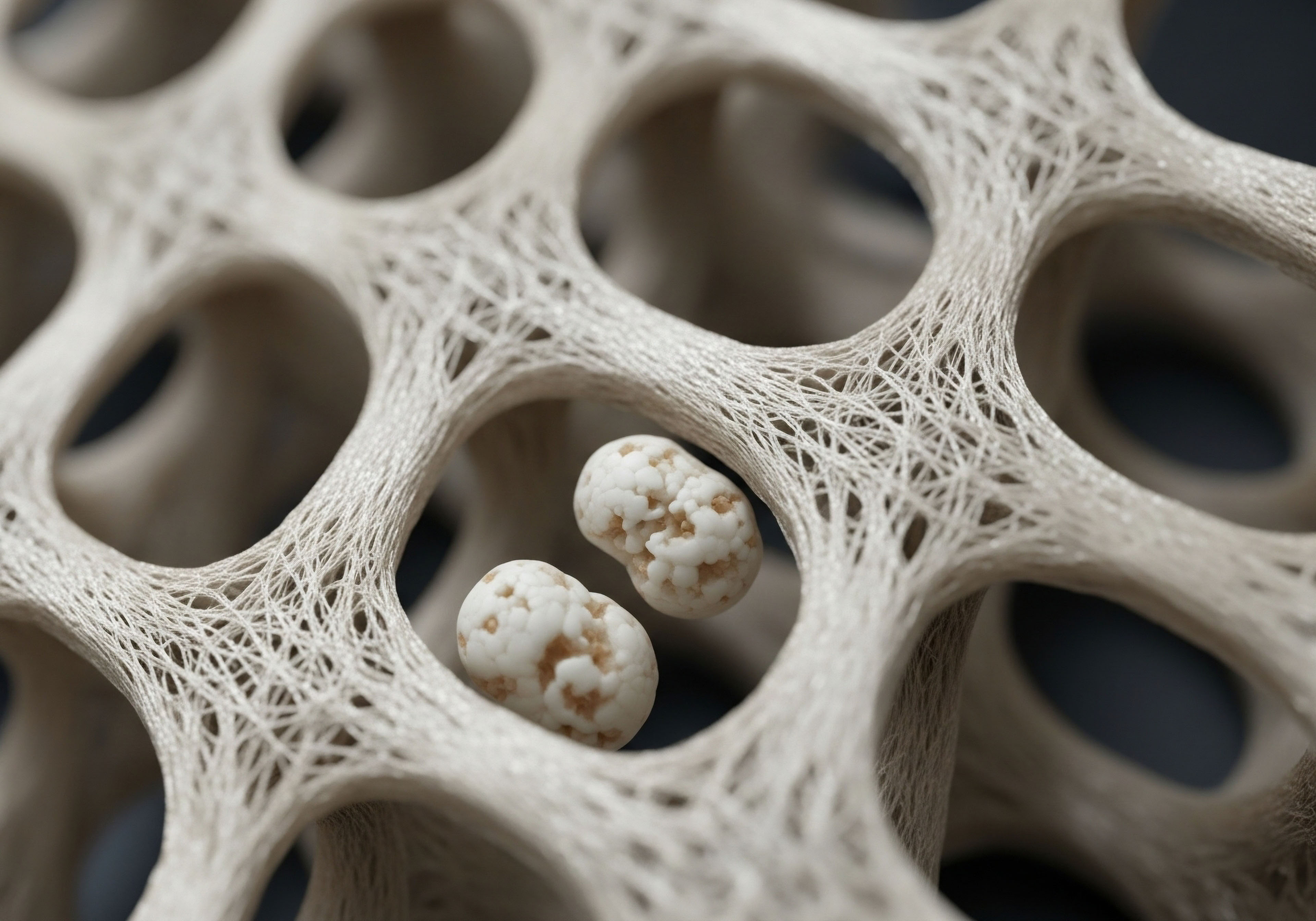

Fundamentals
Feeling a persistent sense of fatigue, a subtle yet unshakeable brain fog, or noticing changes in your body that you cannot quite attribute to aging or lifestyle shifts can be a deeply personal and often isolating experience. These sensations are your body’s method of communicating a systemic imbalance.
When we examine the connection between our sex hormones and thyroid function, we begin to decipher a crucial part of that conversation. The body operates as an interconnected system, where the endocrine glands engage in constant dialogue. Your thyroid, the master regulator of metabolism, and your gonads, the producers of sex hormones, are key participants in this dialogue. An alteration in one area invariably sends ripples across the entire network.
Autoimmune thyroid disease, such as Hashimoto’s thyroiditis, represents a scenario where the body’s own defense mechanisms mistakenly target the thyroid gland. This internal miscommunication is significantly more common in women, a fact that points directly to the influence of female sex hormones on the immune system.
Estrogen, a hormone vital for female reproductive health, also plays a powerful role in modulating immune responses. When estrogen levels are excessively high relative to other hormones, a state known as estrogen dominance, it can amplify the body’s immune activity. This heightened state can contribute to the development and progression of autoimmune conditions by increasing the production of antibodies that attack the thyroid tissue.

The Hormonal Orchestra
Think of your endocrine system as a finely tuned orchestra. Each hormone is an instrument, and for a harmonious symphony of health, each must play in its correct pitch and rhythm. The thyroid hormones, T3 and T4, set the tempo for your body’s metabolic rate.
The sex hormones, primarily estrogen, progesterone, and testosterone, add layers of complexity, influencing everything from mood and energy to bone density and body composition. In a state of thyroid autoimmunity, it is as if one section of the orchestra is playing off-key, creating a dissonance that affects the entire performance. The resulting symptoms are the audible manifestation of this internal discord.
The relationship is bidirectional. While elevated estrogen can promote an autoimmune response against the thyroid, a poorly functioning thyroid can impair the body’s ability to clear excess estrogen from the system. The liver, which is responsible for metabolizing and detoxifying hormones, can become sluggish when thyroid function is low.
This creates a feedback loop where an underactive thyroid contributes to estrogen dominance, and the excess estrogen further suppresses thyroid function and fuels the autoimmune attack. This cycle can explain why symptoms often feel layered and complex, involving both metabolic and hormonal systems.

Validating Your Experience through Biology
Understanding these biological mechanisms provides a framework for validating your lived experience. The weight gain that resists diet and exercise, the persistent coldness, the hair loss, and the pervasive fatigue are not isolated issues. They are predictable consequences of a systemic disruption.
The science of endocrinology allows us to connect these subjective feelings to objective, measurable biological processes. Recognizing that your symptoms have a physiological basis is the first step toward reclaiming your vitality. It shifts the narrative from one of personal failing to one of biological understanding, empowering you to seek targeted and effective support.
Your body’s symptoms are a form of communication, signaling an underlying imbalance within your interconnected hormonal systems.
This foundational knowledge is crucial because it moves the focus toward restoring balance. It underscores the importance of a comprehensive approach that assesses not just thyroid hormone levels, but also the status of your sex hormones and their metabolic pathways. By viewing the body as an integrated whole, we can begin to identify the root causes of the imbalance and develop a personalized strategy to restore hormonal harmony and quiet the autoimmune response.


Intermediate
Building upon the understanding that sex hormones and thyroid function are deeply intertwined, we can now examine the specific clinical mechanisms that drive this interaction. The concept of “estrogen dominance” is a key factor in the higher prevalence of autoimmune thyroid disease in women.
This state describes a condition where the physiological effects of estrogen are exaggerated relative to the counterbalancing effects of progesterone. It can result from either excessive estrogen production, insufficient progesterone, or inefficient estrogen metabolism and detoxification. This imbalance has profound implications for thyroid health, acting through several distinct pathways.
One of the most direct impacts of elevated estrogen is its effect on thyroid-binding globulin (TBG). TBG is a protein produced in the liver that acts as a transport vehicle for thyroid hormones in the bloodstream. When thyroid hormones are bound to TBG, they are in an inactive state and unavailable for use by your cells.
Estrogen stimulates the liver to produce more TBG. Consequently, in a state of estrogen dominance, a greater proportion of your thyroid hormone becomes bound and inactive. This can lead to a situation where a standard blood test shows “normal” total thyroid hormone levels, yet you experience all the symptoms of hypothyroidism because your cells are starved of the active hormone they need to function.

The Progesterone and Testosterone Connection
Progesterone acts as a natural counterbalance to estrogen. It has a calming effect on the immune system and can help to mitigate the pro-inflammatory tendencies of estrogen. Progesterone also supports thyroid function by promoting the conversion of the inactive T4 hormone into the active T3 form.
During the perimenopausal transition, progesterone levels often decline more rapidly than estrogen levels, creating a state of relative estrogen dominance that can unmask or exacerbate a predisposition to thyroid autoimmunity. Therefore, assessing the ratio of estrogen to progesterone provides a more complete picture than looking at either hormone in isolation.
Testosterone, while often considered a male hormone, is also vital for women’s health, contributing to libido, bone density, and muscle mass. From an immunological perspective, testosterone generally has a suppressive effect on the immune system. Research indicates that testosterone therapy in individuals with low levels may lead to a reduction in thyroid autoantibodies, suggesting a protective role against thyroid autoimmunity. This highlights the importance of maintaining optimal androgen levels in both men and women for a well-regulated immune response.

How Do Hormonal Imbalances Manifest?
The clinical presentation of these hormonal imbalances can be varied and often overlaps with symptoms of thyroid dysfunction itself. The following table outlines some of the common symptoms associated with estrogen dominance and low testosterone, illustrating the complexity of diagnosing the root cause of a patient’s complaints.
| Hormonal Imbalance | Common Symptoms in Women | Impact on Thyroid Function |
|---|---|---|
| Estrogen Dominance | Weight gain (hips, thighs), severe PMS, uterine fibroids, heavy or irregular periods, mood swings, brain fog. | Increases TBG, leading to less available active thyroid hormone. Promotes a pro-inflammatory immune state. |
| Low Progesterone | Anxiety, insomnia, infertility, irregular menstrual cycles, headaches. | Reduces the calming, anti-inflammatory balance to estrogen. May impair T4 to T3 conversion. |
| Low Testosterone | Low libido, fatigue, depression, loss of muscle mass, difficulty concentrating. | May reduce the protective, immune-suppressive effects, potentially allowing for increased autoimmune activity. |

Personalized Wellness Protocols
A comprehensive approach to managing thyroid autoimmunity must therefore include a thorough evaluation of the sex hormone profile. This goes beyond simply measuring hormone levels and extends to understanding their metabolism and the balance between them. For women, this may involve mapping hormone levels across the menstrual cycle or assessing metabolites to understand how the body is processing estrogen. For men, evaluating the balance between testosterone and estrogen is equally important.
Understanding the interplay between estrogen, progesterone, and testosterone is essential for developing a targeted approach to managing thyroid autoimmunity.
Based on this detailed assessment, personalized protocols can be developed. For a woman with estrogen dominance and Hashimoto’s, a protocol might focus on supporting liver detoxification pathways to improve estrogen clearance, alongside appropriate thyroid hormone replacement.
For a man with low testosterone and elevated thyroid antibodies, testosterone replacement therapy could be a component of a broader strategy to modulate the immune response and improve overall metabolic health. This level of personalization is what allows for a truly effective and sustainable approach to wellness.


Academic
A sophisticated analysis of the interplay between sex hormones and thyroid autoimmunity requires a deep dive into the molecular and cellular mechanisms that govern immunomodulation. The female preponderance of autoimmune thyroid diseases like Hashimoto’s thyroiditis and Graves’ disease is a well-established epidemiological fact, pointing toward a fundamental role for the X chromosome and sex hormones in shaping immune tolerance.
The effects of estrogen, progesterone, and androgens are mediated through their respective nuclear receptors, which function as ligand-activated transcription factors, directly influencing the expression of genes involved in immune cell differentiation, cytokine production, and apoptosis.
Estrogens, primarily 17β-estradiol, exert a complex, dose-dependent, and context-specific influence on the immune system. At physiological concentrations typical of the female reproductive years, estradiol can promote a pro-inflammatory environment conducive to autoimmunity. It achieves this by enhancing B cell activation and antibody production, including the autoantibodies characteristic of thyroid autoimmunity (anti-thyroperoxidase and anti-thyroglobulin).
Estradiol has been shown to promote the survival of autoreactive B cells and to increase the production of cytokines like B-cell activating factor (BAFF), which is implicated in the pathogenesis of autoimmune thyroid disease.

The Cellular Basis of Hormonal Influence
The differentiation of T helper (Th) cells is a critical control point in the adaptive immune response, and it is significantly influenced by the hormonal milieu. Estradiol tends to promote the differentiation of Th2 cells, which are involved in humoral immunity and antibody production.
In the context of Graves’ disease, this can lead to an overproduction of thyroid-stimulating immunoglobulins. Conversely, androgens like testosterone generally promote a shift toward a Th1-dominant response and enhance the function of regulatory T cells (Tregs), which are crucial for maintaining self-tolerance and suppressing autoimmune reactions. This provides a molecular basis for the observation that testosterone may be protective against the development of autoimmunity.
The following list details some of the specific cellular and molecular effects of sex hormones on the immune system:
- Estrogen ∞ Can increase the expression of Toll-like receptors on immune cells, enhancing their sensitivity to inflammatory triggers. It also promotes the production of pro-inflammatory cytokines such as IL-1, IL-6, and TNF-α in certain contexts.
- Progesterone ∞ Generally exhibits immunosuppressive properties, promoting the production of anti-inflammatory cytokines like IL-10 and supporting the function of regulatory T cells. Its effects are often seen as balancing the pro-inflammatory potential of estrogen.
- Testosterone ∞ Exerts predominantly immunosuppressive effects, inhibiting lymphocyte proliferation and promoting the development of an anti-inflammatory cytokine profile. It can also suppress B cell antibody production.

What Is the Role of Sex Hormone Binding Globulin?
Sex hormone-binding globulin (SHBG) is another critical variable in this complex equation. Thyroid hormones directly regulate the synthesis of SHBG in the liver. Hyperthyroidism leads to increased SHBG levels, which in turn reduces the bioavailability of free testosterone. This can create a state of relative androgen deficiency, potentially exacerbating autoimmunity.
Hypothyroidism has the opposite effect, lowering SHBG and increasing free testosterone levels. This intricate feedback system demonstrates the systems-biology nature of endocrine regulation, where the thyroid and gonadal axes are inextricably linked.
The differential effects of sex hormones on T helper cell differentiation and cytokine production provide a molecular explanation for the gender bias observed in autoimmune thyroid disease.
The table below summarizes the influence of thyroid status on SHBG and the resulting impact on sex hormone bioavailability.
| Thyroid State | Effect on SHBG Production | Impact on Sex Hormone Bioavailability | Potential Clinical Consequence |
|---|---|---|---|
| Hyperthyroidism | Increased synthesis | Decreased free testosterone, potentially increased free estradiol | Exacerbation of estrogen-driven autoimmune processes |
| Hypothyroidism | Decreased synthesis | Increased free testosterone, potentially decreased free estradiol | Shift in the hormonal milieu, with complex effects on immunity |

A Systems Biology Perspective
A comprehensive understanding of this topic requires a systems-biology perspective that integrates genetics, epigenetics, and environmental factors. Genetic susceptibility plays a significant role in determining an individual’s risk for thyroid autoimmunity. However, the expression of these genes can be modified by epigenetic mechanisms, such as DNA methylation and histone acetylation, which are themselves influenced by the hormonal environment.
For example, estrogen has been shown to alter the methylation patterns of genes involved in immune regulation, providing a mechanism by which hormonal fluctuations can translate into long-term changes in immune function. This integrated view is essential for developing next-generation therapeutic strategies that target the root of the autoimmune process.

References
- Arduc, A. Aycicek, D. G. & Tetik, S. F. (2021). The impact of sex hormones on autoimmune thyroid disease. Endocrine, Metabolic & Immune Disorders-Drug Targets (Formerly Current Drug Targets-Immune, Endocrine & Metabolic Disorders), 21 (5), 847-854.
- Garelli, S. Masiero, S. & Giammona, E. (2021). The role of sex hormones in the modulation of the immune system in autoimmune diseases. Frontiers in Immunology, 12, 644349.
- Koehler, V. F. & Cutolo, M. (2022). The endocrine-immune-metabolic cross-talk in autoimmune and rheumatic diseases. Clinical and Experimental Rheumatology, 40 (10), 1883-1892.
- Ngo, S. T. Steyn, F. J. & McCombe, P. A. (2014). Gender differences in autoimmune disease. Frontiers in neuroendocrinology, 35 (3), 347-369.
- Pyzik, A. Grywalska, E. & Roliński, J. (2017). The role of sex hormones in the pathogenesis of autoimmune diseases. Postepy higieny i medycyny doswiadczalnej (Online), 71, 1114-1121.

Reflection
The information presented here offers a detailed map of the biological terrain where your hormones and immune system interact. This knowledge serves as a powerful tool, transforming abstract symptoms into understandable physiological processes. Your personal health narrative is unique, shaped by your genetics, your life experiences, and your individual biochemistry.
Consider how these scientific insights resonate with your own story. The path to optimal wellness is a process of discovery, a journey of connecting the dots between how you feel and how your body functions. This understanding is the first, most crucial step in that process, empowering you to ask deeper questions and seek a partnership in health that is tailored to your specific needs. The potential for recalibrating your system and reclaiming your vitality lies within this personalized approach.



